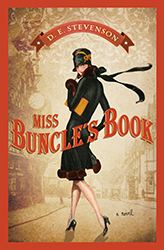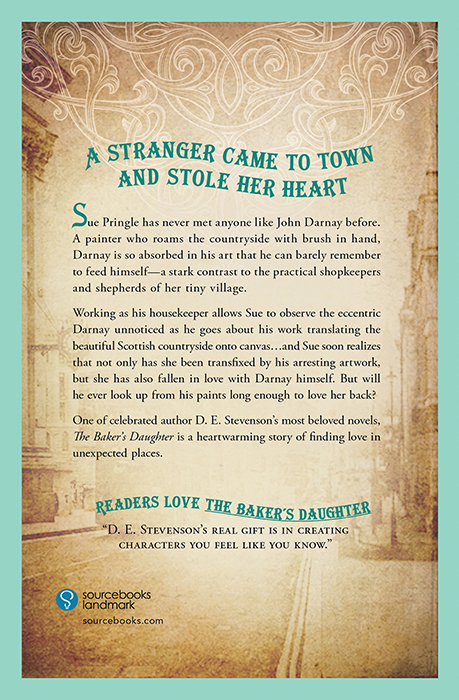The Baker’s Daughter (23 page)
Read The Baker’s Daughter Online
Authors: D. E. Stevenson

Miss Buncle blushed; she neither confirmed nor denied that Dorcas was Susan (or Susan, Dorcas). Mr. Abbott did not press the point.
“Well, so hens were definitely ruled out,” he prompted.
“Yes. Then I thought of paying guests, but there is already an establishment for paying guests in Silverstream.”
“You couldn't take the bread out of Mrs. Turpin's mouth.”
“Mrs. Dick,” corrected Miss Buncle quickly.
“Very ingenious,” commented Mr. Abbott, “and of course SusanâI mean Dorcasâwouldn't have liked PGs either.”
“She didn't like the idea at all,” Miss Buncle assured him.
“So then you thought of a book.”
“It was Dorcas really,” said Miss Buncle, giving honor where honor was due.
Mr. Abbott felt like shaking her. Why couldn't she tell him about the book like a human being instead of having to have everything dragged out of her by main force? Most authors were only too ready to discuss the inception of their booksâonly too ready. He looked at Miss Buncle, feeling that he wanted to shake her, and suddenly found himself wondering what her name was. She was Elizabeth in the book, of courseâElizabeth Wadeâbut what was her real name? Jane? Margaret? Ann?
“And how does Dorcas like the book?” inquired Mr. Abbott.
“She hasn't read it yet,” replied Miss Buncle. “She hasn't much time for reading, and I wasn't very keen for her to read it. You see, I don't think she will like it much; she likes something exciting. My book's not exciting, is it? At least the first part isn't. But life in Silverstream is rather dull, and I can only write about what I know. At least,” she added, twisting her hands in her effort to explain her limitations as an author and be perfectly truthful about it all, “at least I can only write about
people
that I know. I can make them
do
things, of course.”
Somehow Mr. Abbott was sure that she was thinking of those passionate love scenes on the terrace in the light of the Harvest Moon. He was almost persuaded now that
Chronicles
of
an
English
Village
was a straight storyâno satire intended. It did not matter in the least, of course, because nearly everybody would think otherwise, but he did want to be sure.
“How did you feel when you wrote it?” he asked her suddenly.
“Well,” she replied after a moment's thought, “it was difficult to start, and then it went on by itself like a snowball rolling down a hill. I began to look at people with different eyes, and they all seemed more interesting. Then, after a bit, I began to get quite frightened because it was all mixed up in my mindâSilverstream and Copperfieldâand some days I didn't know which was which. And when I walked down to the village to do my shopping it was sometimes Copperfield and sometimes Silverstream, and when I met Colonel Weatherhead I couldn't remember whether he had really proposed to Dorothea Bold or notâand I thought I must be going mad or something.”
Mr. Abbott had heard this kind of talk before and it had never impressed him very much. Miss Buncle did impress him because she wasn't trying to; she was simply answering his questions to the best of her ability and with the utmost truthfulness.
“Copperfield is actually Silverstream?” inquired Mr. Abbott.
“Yesâyou see I have no imagination at all,” said Miss Buncle sadly.
“But the second partâsurely the second part is not all true?” gasped Mr. Abbott.
Miss Buncle admitted that it was not. “That was just an idea that came to me suddenly,” she said modestly. “They all seemed so smug and settled, I thought it would be fun to wake them up.”
“It must have been fun,” he agreed.
From this point they went on to discuss the name, and Mr. Abbott explained his ideas on the subject. The title was a trifle dull, not a good selling title. He suggested
Disturber
of
the
Peace
. Miss Buncle was only too ready to bow to his superior knowledge of such things.
“And now for the contract,” said Mr. Abbott cheerfully. He rang the bell; the contract was brought and with it came Mr. Spicer and two clerks to witness the signatures. Mr. Abbott could have cheated Miss Buncle quite easily if he had wanted to; fortunately for her he didn't want to, it was not his way. You make friends with the goose and treat it decently and it continues to lay golden eggs. In his opinion,
Disturber
of
the
Peace
was a golden egg, but whether Miss Goose Buncle would lay any more was beyond the power of man to tell. She said herself that she could only write about what she knewâor rather (and wasn't this an important distinction) about
people
she knew. It was an admission made by no author that Mr. Abbott had ever met beforeâa staggering admission. But to take it at its worst, there was no reason to suppose that Miss Buncle had exhausted the whole essence of Copperfield in one book. Mr. Abbott wanted other books from Miss Buncle, books about Copperfield or any other place, provided that they had the same flavor.
This being so, Miss Buncle was asked to sign a very fair contract with Abbott & Spicer Ltd., in which she promised the first option of three more novels to the firm.
“Of course, I may not write any more,” she protested, aghast at this mountain of work that had reared itself so suddenly in her path.
Mr. Spicer looked somewhat alarmed at this admission of sterility, but Mr. Abbott was all smiles.
“Of course you may not,” he comforted her. “Sign your name just there. But somehow or other, I think you will.”
So she signed her nameâBarbara Buncleâvery neatly, exactly where she was told, with Mr. Abbott's very fat fountain pen, and the others put on their spectaclesâat least Messrs Abbott & Spicer did, the clerks were too young to require any artificial aidâand signed too, in a very businesslike way, and soon after this, Barbara Buncle found herself in the street, slightly dazed and exceedingly hungry, for it was long past her usual hour for lunch and she had breakfasted early.
Brummel Street was crowded and noisy. Miss Buncle was jostled by newsboys selling afternoon editions of various papers and by business men hurrying to unknown but obviously important appointments. Nobody took any notice of Miss Buncle except to say “Sorry” or “Pardon me” when they nearly bumped her into the road.
The open door of a small restaurant seemed a refuge; she found a table and ordered coffee and buns and chocolate éclairs for she had an unsophisticated palate and a good digestion. Then, laying her handbag with the copy of the contract on the table beside her plate, she considered herself and the strange sequence of events that had brought her to this pass.
“I'm an author,” she said to herself. “How very odd!”
* * *
Colonel Weatherhead was on the Silverstream trainâhe had been in town paying a visit to his tailorâand waved his paper at Miss Buncle as she came along the platform.
“Come along, come along,” he said, quite unnecessarily, for Miss Buncle was coming along very well, and the train was not thinking of starting.
“I didn't know you were in town,” said Miss Buncle as the Colonel took her umbrella and placed it on the rack.
“And I didn't know you were,” he replied. “You have had a successful day, I trust.”
Colonel Weatherhead had a gallant and slightly jocular manner with the fair sex that had come out very successfully in
Disturber
of
the
Peace
. In spite of this he was really a very nice man, Miss Buncle thought. She had not been too unkind to him, she had merely drawn him as he wasâand after all she had given him a very nice wife; Dorothea Bold was a dear.
Miss Buncle said she had had a very successful day.
“Hats or the dentist?” inquired the Colonel naming the two reasons that usually brought the inhabitants of Silverstream to town.
Miss Buncle said it was neither, and blushed. She was feeling a little guilty over her enormous secret.
“AhaâI see I must not inquire further,” said the Colonel archly. “Some fellers have all the luckâby Jove they have!”
Miss Buncle looked down and smiled; she would not be drawn. If Colonel Weatherhead liked to think she had gone to London to meet a man he must just continue to think so.
And of course I did
, thought Miss Buncle to herself,
but not in the way he thinksâor pretends to think, for of course he doesn't really think I went to meet a man, but he thinks that I would like him to think so.
It was rather muddled put like that, but Miss Buncle knew what she meant herself, which was the main thing.
The train started without anyone else invading their solitude.
“Would you like the window up or down?” asked Colonel Weatherhead attentively. “This one up and that one down? How pleasant to get a little fresh air. I can't think how anyone can live in London and breathe.”
Miss Buncle agreed, and added that it was the noise she disliked.
“Dreadful!” said the Colonel. “Dreadful!”
Part of her hoped that Colonel Weatherhead would now settle down comfortably to the perusal of his papers and leave her in peace, but the other part hoped that he would continue to talk. He was such excellent copy, and although
Disturber
of
the
Peace
(such an excellent name suggested by that nice clever Mr. Abbott) was finished and done with, she had gotten into the habit of watching people and listening to them. It had become second nature to her.
Colonel Weatherhead did not continue to produce copy for Miss Buncle; he took up a paper and scanned it but without seeing anything to interest him. The visit to his tailor had disturbed him, and he was still smarting under the disclosures of the tape. Two inches around the waist since Januaryâquite horrible! An hour's digging in the garden before lunch might help, and perhaps an extra ten minutes' exercise before breakfast.
Miss Buncle was also immersed in secret thoughts, but hers were pleasant. The houses sped by and were gradually replaced by orchards and fields.
Order D. E. Stevenson's book

Miss Buncle's Book
On sale now
D. E. Stevenson (1892â1973) had an enormously successful writing career: between 1923 and 1970, four million copies of her books were sold in Britain and three million in the United States. Her books include
Miss Buncle's Book, Miss Buncle Married, The Young Clementina, Listening Valley,
The Two Mrs. Abbotts, The Four Graces, Celia's House,
and
The Baker's Daughter
. D. E. Stevenson was born in Edinburgh in 1892; she lived in Scotland all her life. She wrote her first book in 1923, but her second did not appear for nine years. She published
The Baker's Daughter
in 1938.

